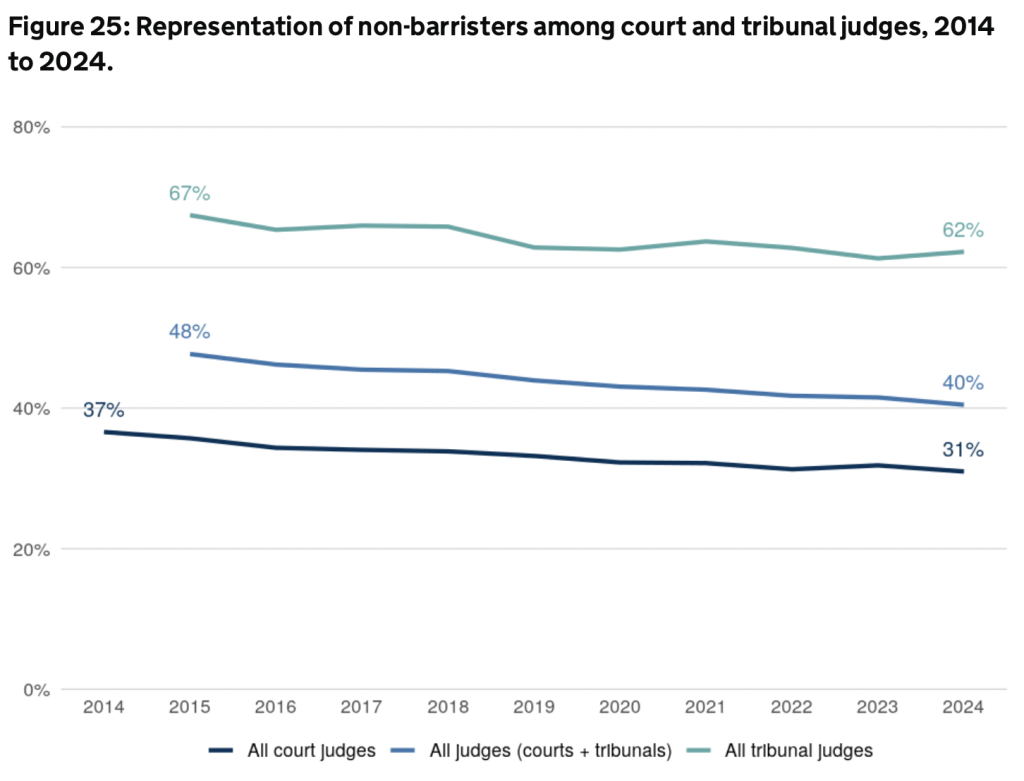As the number of non-barristers on the bench falls to its lowest point in a decade, what is holding solicitors back?

Solicitors are joining the judiciary in the lowest numbers seen in a generation. In recently published advice, the Judicial Appointments Commission (JAC) highlighted the ongoing underrepresentation of solicitors within the judiciary and offered guidance for those applying for judicial roles.
According to the July 2024 Judicial Diversity Forum Report, in 2023-24, 52% of applicants for legally qualified judicial roles were solicitors, while 29% were barristers.
Although solicitors made up just over half of applicants, given the size of the pool of eligible solicitors, this proportion is strikingly low. As of 2023, there were more than 160,000 practicing solicitors in England & Wales, compared to only 17,000 barristers.
Furthermore, solicitors only made up 32% of recommendations for appointment in 2023-24, compared to barristers, who made up 40%, meaning that being a solicitor more than halves the odds of successfully applying for the bench, compared to barristers.
While representation of women and ethnic minorities has increased in the judiciary, representation of non-barristers among judges it at its lowest point in a decade, having consistently fallen since 2014.

Why are solicitors less likely to apply for judicial roles?
Research compiled for the Ministry of Justice by the National Centre for Social Research (NCSR) in 2023, shows that solicitors were likely to ‘self-select out’ of the judicial appointment process, believing that there was a preference to appoint senior barristers to these roles.
The NCSR also found that solicitors were deterred from considering judicial positions because of a perceived hierarchy within the legal profession, barristers being considered the most elite, and that solicitors are less confident in their skills and experience, compared with their peers at the Bar.
An interview with two solicitor-judges published by the Law Society, mentions relative distance from the courts as a factor affecting solicitors’ confidence applying for judicial roles. Recorder Ayesha Siddiqi said, “It can feel daunting to apply for a judicial appointment if you don’t come from a litigation background.” While High Court judge Karen Ridge commented, “Perhaps solicitors don’t have the same networks as barristers, who sometimes have the advantage of seeing colleagues take on part-time judicial roles.”
The barriers to appointment
A lack of experience at court can also hinder solicitors who do apply from securing judicial roles. Ridge offers this advice to solicitors, “If you’re thinking of a judicial career, I’d encourage you to consider applying for both fee-paid tribunal and deputy district judge appointments. You can then acquire judicial skills which may assist in your application for more senior roles.”
This echoes the advice given by the JAC, which claims, “Not being prepared or fully understanding the role of a judge is a common mistake candidates make,” and continues by advising that candidates “at a minimum” should “sit in with judges to get a broader understanding of the role” and “observe a public hearing to see how a judge manages a courtroom”.
For top solicitors working in demanding commercial firms, taking on a part time judicial role – or even taking time out to visit court – may seem almost impossible.
The difficulties of preparing for a judicial appointment while working as a solicitor in private practice have been emphasised by figures including Paul Richmond, chair of the Northern Circuit District Judges Association. Speaking in 2021, Richmond pointed out:
“Firms of solicitors are becoming less keen on senior figures taking time out, several days a month, to serve as deputy district judges … Keeping them in the office is a way to stop them becoming full-time members of the judiciary.”
Back in 2009, Sir Igor Judge, then the Lord Chief Justice, also laid some responsibility with law firms. “Before any individual can become a full-time judge, he or she must take on part-time judicial responsibilities,” he wrote in the Law Society Gazette, before pointing to a “reluctance” from senior lawyers “to allow their younger partners time away from the office to gain judicial experience as part-time judges” as an obstacle that prevents solicitors from gaining this experience.
Support for solicitor candidates for judicial roles
Combatting the ongoing issue of diversity on the bench, the JAC runs support schemes for judicial candidates such as the Targeted Outreach programme which helps candidates from underrepresented groups, including solicitors, prepare for the process.
Commenting on the representation of solicitors in the judiciary, Law Society of England and Wales president Richard Atkinson said:
“There is still much work to do to address the fact that the judiciary in England and Wales does not reflect a diverse and inclusive profession. We are committed to seeing an increase in successful solicitor appointments. We continue to work with the Judicial Diversity Forum (JDF) partners to support initiatives which seek to improve diversity and help eligible solicitors demonstrate their breadth of unique, transferable and invaluable experience during the selection process”
A JAC spokesperson said: “The judiciary benefits from having people from different professional backgrounds, which is why we work together with applicants, the professions and the judiciary to help prepare talented candidates for these roles. We would encourage anyone who is interested to take a look at the range of materials on our website.”


